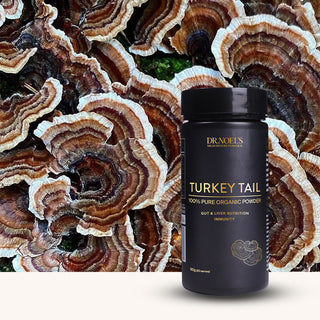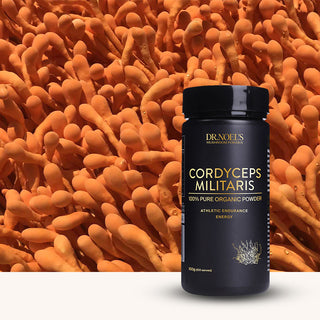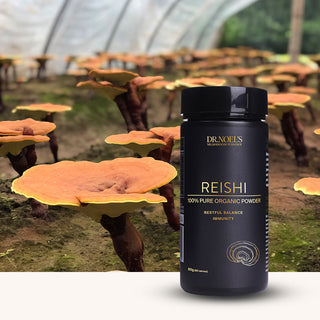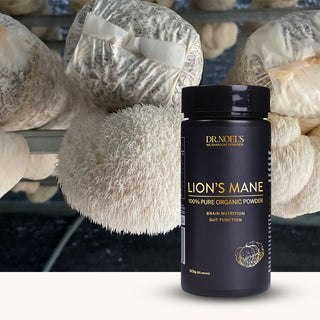
Mushrooms have a long history of use in traditional medicine, spanning thousands of years.[1,2] Fungi like mushrooms and yeast are rich in a compound called beta-glucan, known for its antiviral and immune-boosting effects.[3,4] Studies in humans show that beta-glucan intake can enhance immune responses,[5] reduce the frequency, severity, and duration of upper respiratory infections like colds and flu,[6-8] and relieve seasonal allergy symptoms.[9] Researchers have pinpointed three mushrooms with particularly strong immune benefits: shiitake,[10] maitake,[11] and chaga.[12] Combining isolated beta-glucan with mushroom extracts provides a comprehensive immune support solution.
How Beta-Glucan Enhances Immunity
Beta-glucan is a polysaccharide found in the cell walls of fungi, bacteria, and whole grains like oats. Mushrooms are particularly high in beta-glucan, which can also be derived from yeast. These compounds help maintain immune health, boosting defense against viruses and other pathogens.[13-15] Preclinical research shows they can also reduce the impact of endotoxins, harmful by-products from bacterial infections that trigger inflammation.[16,17]
There are two types of immune responses: innate and adaptive.[18,19] Innate immunity is the body's first line of defense, where macrophages consume and neutralize viruses and other pathogens, and natural killer (NK) cells target and destroy unhealthy cells affected by viruses or pathogens. Adaptive immunity is more specific, arising after exposure to a specific pathogen and offering long-term protection through T and B cells. Beta-glucan can activate and stimulate both innate and adaptive immunity.[10,20,21]
As we age, our immune system weakens, losing the ability to resist infections and cancer—an effect known as immunosenescence. Animal studies suggest that beta-glucan intake may prevent or even reverse immunosenescence.[20,22] Renewing these immune responses is particularly important for older adults.
Mushrooms with the Most Health Benefits
Mushrooms contain various beneficial compounds, including indoles, polyphenols, and carotenoids. Beta-glucan is one of the bioactive immune-supporting compounds found in mushrooms.[23] Among the thousands of mushrooms with health benefits, three stand out for their immune-boosting effects: shiitake, maitake, and chaga.
Shiitake: Widely used in traditional Chinese medicine, shiitake mushrooms have beta-glucan that reduces bacterial load in animal models of severe lung infection and improves health outcomes.[25] Cell studies indicate shiitake can deactivate viruses and inhibit viral replication.[26,27] Clinical research suggests its immune-enhancing effects are due to its ability to increase immune cells like T cells and NK cells.[10] Shiitake also reduces markers of harmful chronic inflammation and stimulates the secretion of gut-protective antibodies.[10]
Maitake: Known in Asian cuisine, maitake mushrooms offer significant immune benefits. Animal research shows maitake extract can enhance NK cell activity and bacterial elimination, particularly when combined with shiitake extract.[28,29] Maitake extract also boosts the release of interferon-gamma (IFN-γ), a protein that inhibits viral replication.[29]
Chaga: Originating from cold climates and typically growing on birch trees, chaga mushrooms serve as immune modulators. Preclinical studies demonstrate the antiviral properties of chaga extract.[30] In studies on immune-deficient mice, chaga extract restored immune cells to near-normal levels and regulated inflammation indicators like TNF-α, suggesting it could prevent excessive inflammation.[31] Chaga extract has also shown beneficial activity against various viruses in preclinical studies.[12,30,32]

Defending Against Infections
Research shows that beta-glucan helps prevent and treat bacterial, viral, and parasitic infections.[33-35] In multiple placebo-controlled human trials, participants randomly received either beta-glucan or a placebo. These trials used at least 250 mg of beta-glucan per day, and participants taking beta-glucan experienced reduced upper respiratory infections, shorter symptom duration, fewer lost workdays, increased circulating interferon, and higher levels of salivary antibodies that protect against respiratory and gastrointestinal pathogens.[5-8,36,37]
Another study evaluated beta-glucan’s effects on adults with moderate seasonal ragweed allergies. Those who took 250 mg of beta-glucan daily had reduced allergy symptoms’ duration and intensity and improvements in sleep, quality of life, energy, and mood compared to the placebo group.[9]
The Immune Benefits of Mushrooms
Mushrooms have a long history in traditional medicine. Fungi, including mushrooms and yeast, are rich in beta-glucan and other immune-supporting compounds. In human trials, beta-glucan intake has been shown to reduce the frequency and duration of upper respiratory infections, including colds and flu, and to relieve seasonal allergy symptoms.
A meta-analysis of observational studies revealed that those who consume the most mushrooms have a 34% lower cancer risk than those who do not eat mushrooms. Combining beta-glucan with immune-supporting extracts of shiitake, maitake, and chaga mushrooms can strengthen the immune system’s ability to fight infections and other illnesses.
Enhanced Gut Health
The digestive tract hosts a variety of microorganisms, and a balanced microbiome is essential for fighting infection and maintaining immune health.[38] Beta-glucan and mushrooms enhance immunity by promoting the growth of healthy microbes in the gut. As a prebiotic fiber, beta-glucan nourishes beneficial bacteria.[13,39] Research shows a healthy microbiome supports immune responses, maintains gut wall integrity, and suppresses pathogenic bacteria and inflammation.[13,40-42] Beta-glucan also promotes the production of short-chain fatty acids, which are crucial for gut health and preserving the gut barrier’s integrity.[13,40,42]
Fighting Cancer
In September 2024, scientists from Penn State College of Medicine published results from a cohort study involving over 30,000 participants and a meta-analysis of over 600,000 participants to investigate the link between mushroom intake and mortality risk.[43] They found that higher mushroom consumption correlated with a reduced risk of death from all causes. This study's strengths include analyzing a nationally representative sample of U.S. adults and a comprehensive meta-analysis of cohort studies worldwide.
The immune system, when functioning normally, can identify and eliminate cancer cells. By boosting immunity, mushrooms can enhance this ability. A meta-analysis of observational studies including over 615,000 people, with nearly 20,000 cancer cases from 1966 to 2020, found that the highest mushroom consumers had a 34% lower cancer risk than those who ate the fewest mushrooms.[44] Beta-glucan and other compounds in shiitake, maitake, and chaga enhance protective signaling proteins that inhibit tumor cell growth.[30] The beta-glucan and extracts from these mushrooms can provide multiple immune-supporting compounds.
Mushrooms have been used medicinally for thousands of years. Research shows they contain beta-glucan, which boosts immunity and gut health and may help prevent viral infections and cancer. Beta-glucan, isolated from yeast, combined with extracts of shiitake, maitake, and chaga mushrooms, offers comprehensive immune support benefits.
Reference:
- Stamets P, Zwickey H. Medicinal Mushrooms: Ancient Remedies Meet Modern Science. Integr Med (Encinitas). 2014 Feb;13(1):46-7.
- Ray P, Kundu S, Paul D. Exploring the therapeutic properties of chinese mushrooms with a focus on their anti-cancer effects: A systemic review. Pharmacological Research - Modern Chinese Medicine. 2024 2024/06/01/;11:100433.
- Cerletti C, Esposito S, Iacoviello L. Edible Mushrooms and Beta-Glucans: Impact on Human Health. Nutrients. 2021 Jun 25;13(7).
- Seo DJ, Choi C. Antiviral Bioactive Compounds of Mushrooms and Their Antiviral Mechanisms: A Review. Viruses. 2021 Feb 23;13(2).
- Carpenter KC, Breslin WL, Davidson T, et al. Baker’s yeast beta-glucan supplementation increases monocytes and cytokines post-exercise: implications for infection risk? Br J Nutr. 2013 Feb 14;109(3):478-86.
- Mah E, Kaden VN, Kelley KM, et al. Beverage Containing Dispersible Yeast beta-Glucan Decreases Cold/Flu Symptomatic Days After Intense Exercise: A Randomized Controlled Trial. J Diet Suppl. 2020;17(2):200-10.
- McFarlin BK, Carpenter KC, Davidson T, et al. Baker’s yeast beta glucan supplementation increases salivary IgA and decreases cold/flu symptomatic days after intense exercise. J Diet Suppl. 2013 Sep;10(3):171-83.
- Feldman S, Schwartz H, Kalman D, et al. Randomized Phase II Clinical Trials of Wellmune WGP® for Immune Support During Cold and Flu Season. J Appl Res. 2009 01/01;9.
- Talbott SM, Talbott JA, Talbott TL, et al. beta-Glucan supplementation, allergy symptoms, and quality of life in self-described ragweed allergy sufferers. Food Sci Nutr. 2013 Jan;1(1):90-101.
- Dai X, Stanilka JM, Rowe CA, et al. Consuming Lentinula edodes (Shiitake) Mushrooms Daily Improves Human Immunity: A Randomized Dietary Intervention in Healthy Young Adults. J Am Coll Nutr. 2015;34(6):478-87.
- Wu JY, Siu KC, Geng P. Bioactive Ingredients and Medicinal Values of Grifola frondosa (Maitake). Foods. 2021 Jan 5;10(1).
- Lu Y, Jia Y, Xue Z, et al. Recent Developments in Inonotus obliquus (Chaga mushroom) Polysaccharides: Isolation, Structural Characteristics, Biological Activities and Application. Polymers (Basel). 2021 Apr 29;13(9):1441.
- Ciecierska A, Drywien ME, Hamulka J, et al. Nutraceutical functions of beta-glucans in human nutrition. Rocz Panstw Zakl Hig. 2019;70(4):315-24.
- Jin Y, Li P, Wang F. beta-glucans as potential immunoadjuvants: A review on the adjuvanticity, structure-activity relationship and receptor recognition properties. Vaccine. 2018 Aug 23;36(35):5235-44.
- Wang G, Li Z, Tian M, et al. beta-Glucan Induces Training Immunity to Promote Antiviral Activity by Activating TBK1. Viruses. 2023 May 19;15(5).
- Smiderle FR, Alquini G, Tadra-Sfeir MZ, et al. Agaricus bisporus and Agaricus brasiliensis (1-->6)-beta-D-glucans show immunostimulatory activity on human THP-1 derived macrophages. Carbohydr Polym. 2013 Apr 15;94(1):91-9.
- Cheng J, Zhang G, Liu L, et al. Anti-inflammatory activity of beta-glucans from different sources before and after fermentation by fecal bacteria in vitro. J Sci Food Agric. 2024 Jan 30;104(2):1116-31.
- Available at: https://www.informedhealth.org/the-innate-and-adaptive-immune-systems.html. Accessed September 5, 2024.
- Marshall JS, Warrington R, Watson W, et al. An introduction to immunology and immunopathology. Allergy, Asthma & Clinical Immunology. 2018 2018/09/12;14(2):49.
- Song L, Yuan J, Ni S, et al. Enhancement of adaptive immune responses of aged mice by dietary intake of beta-glucans, with special emphasis on anti-aging activity. Mol Immunol. 2020 Jan;117:160-7.
- Cognigni V, Ranallo N, Tronconi F, et al. Potential benefit of beta-glucans as adjuvant therapy in immuno-oncology: a review. Explor Target Antitumor Ther. 2021;2(2):122-38.
- Xu X, Yang J, Ning Z, et al. Lentinula edodes-derived polysaccharide rejuvenates mice in terms of immune responses and gut microbiota. Food Funct. 2015 Aug;6(8):2653-63.
- Riaz S, Ahmad A, Farooq R, et al. Edible Mushrooms, a Sustainable Source of Nutrition, Biochemically Active Compounds and Its Effect on Human Health. In: Naofumi S, Anna S, editors. Current Topics in Functional Food. Rijeka: IntechOpen; 2022:Ch. 12.
- Anusiya G, Gowthama Prabu U, Yamini NV, et al. A review of the therapeutic and biological effects of edible and wild mushrooms. Bioengineered. 2021 Dec;12(2):11239-68.
- Masterson CH, Murphy EJ, Gonzalez H, et al. Purified beta-glucans from the Shiitake mushroom ameliorates antibiotic-resistant Klebsiella pneumoniae-induced pulmonary sepsis. Lett Appl Microbiol. 2020 Oct;71(4):405-12.
- Ren G, Xu L, Lu T, et al. Structural characterization and antiviral activity of lentinan from Lentinus edodes mycelia against infectious hematopoietic necrosis virus. Int J Biol Macromol. 2018 Aug;115:1202-10.
- Rincao VP, Yamamoto KA, Ricardo NM, et al. Polysaccharide and extracts from Lentinula edodes: structural features and antiviral activity. Virol J. 2012 Feb 15;9:37.
- Hou L, Meng M, Chen Y, et al. A water-soluble polysaccharide from Grifola frondosa induced macrophages activation via TLR4-MyD88-IKKbeta-NF-kappaB p65 pathways. Oncotarget. 2017 Oct 17;8(49):86604-14.
- Vetvicka V, Vetvickova J. Immune-enhancing effects of Maitake (Grifola frondosa) and Shiitake (Lentinula edodes) extracts. Ann Transl Med. 2014 Feb;2(2):14.
- Fordjour E, Manful CF, Javed R, et al. Chaga mushroom: a super-fungus with countless facets and untapped potential. Front Pharmacol. 2023;14:1273786.
- Kim YR. Immunomodulatory Activity of the Water Extract from Medicinal Mushroom Inonotus obliquus. Mycobiology. 2005 Sep;33(3):158-62.
- Shibnev VA, Garaev TM, Finogenova MP, et al. [Antiviral activity of aqueous extracts of the birch fungus Inonotus obliquus on the human immunodeficiency virus]. Vopr Virusol. 2015;60(2):35-8.
- Ji L, Sun G, Li J, et al. Effect of dietary beta-glucan on growth, survival and regulation of immune processes in rainbow trout (Oncorhynchus mykiss) infected by Aeromonas salmonicida. Fish Shellfish Immunol. 2017 May;64:56-67.
- Udayangani RMC, Dananjaya SHS, Fronte B, et al. Feeding of nano scale oats beta-glucan enhances the host resistance against Edwardsiella tarda and protective immune modulation in zebrafish larvae. Fish Shellfish Immunol. 2017 Jan;60:72-7.
- Yun CH, Estrada A, Van Kessel A, et al. Beta-glucan, extracted from oat, enhances disease resistance against bacterial and parasitic infections. FEMS Immunol Med Microbiol. 2003 Jan 21;35(1):67-75.
- McFarlin BK, Venable AS, Carpenter KC, et al. Oral Supplementation with Baker’s Yeast Beta Glucan Is Associated with Altered Monocytes, T Cells and Cytokines following a Bout of Strenuous Exercise. Front Physiol. 2017;8:786.
- Talbott S, Talbott J. Effect of BETA 1, 3/1, 6 GLUCAN on Upper Respiratory Tract Infection Symptoms and Mood State in Marathon Athletes. J Sports Sci Med. 2009;8(4):509-15.
- Wiertsema SP, van Bergenhenegouwen J, Garssen J, et al. The Interplay between the Gut Microbiome and the Immune System in the Context of Infectious Diseases throughout Life and the Role of Nutrition in Optimizing Treatment Strategies. Nutrients. 2021 Mar 9;13(3).
- Shoukat M, Sorrentino A. Cereal β‐glucan: a promising prebiotic polysaccharide and its impact on the gut health. International Journal of Food Science & Technology. 2021;56(5):2088-97.
- Jayachandran M, Chen J, Chung SSM, et al. A critical review on the impacts of beta-glucans on gut microbiota and human health. J Nutr Biochem. 2018 Nov;61:101-10.
- Jayachandran M, Xiao J, Xu B. A Critical Review on Health Promoting Benefits of Edible Mushrooms through Gut Microbiota. Int J Mol Sci. 2017 Sep 8;18(9).
- Mitsou EK, Saxami G, Stamoulou E, et al. Effects of Rich in Beta-Glucans Edible Mushrooms on Aging Gut Microbiota Characteristics: An In Vitro Study. Molecules. 2020 Jun 18;25(12).
- Ba DM, Gao X, Al-Shaar L, et al. Prospective study of dietary mushroom intake and risk of mortality: results from continuous National Health and Nutrition Examination Survey (NHANES) 2003-2014 and a meta-analysis. Nutr J. 2021 Sep 21;20(1):80.
- Ba DM, Ssentongo P, Beelman RB, et al. Higher Mushroom Consumption Is Associated with Lower Risk of Cancer: A Systematic Review and Meta-Analysis of Observational Studies. Adv Nutr. 2021 Oct 1;12(5):1691-704.





